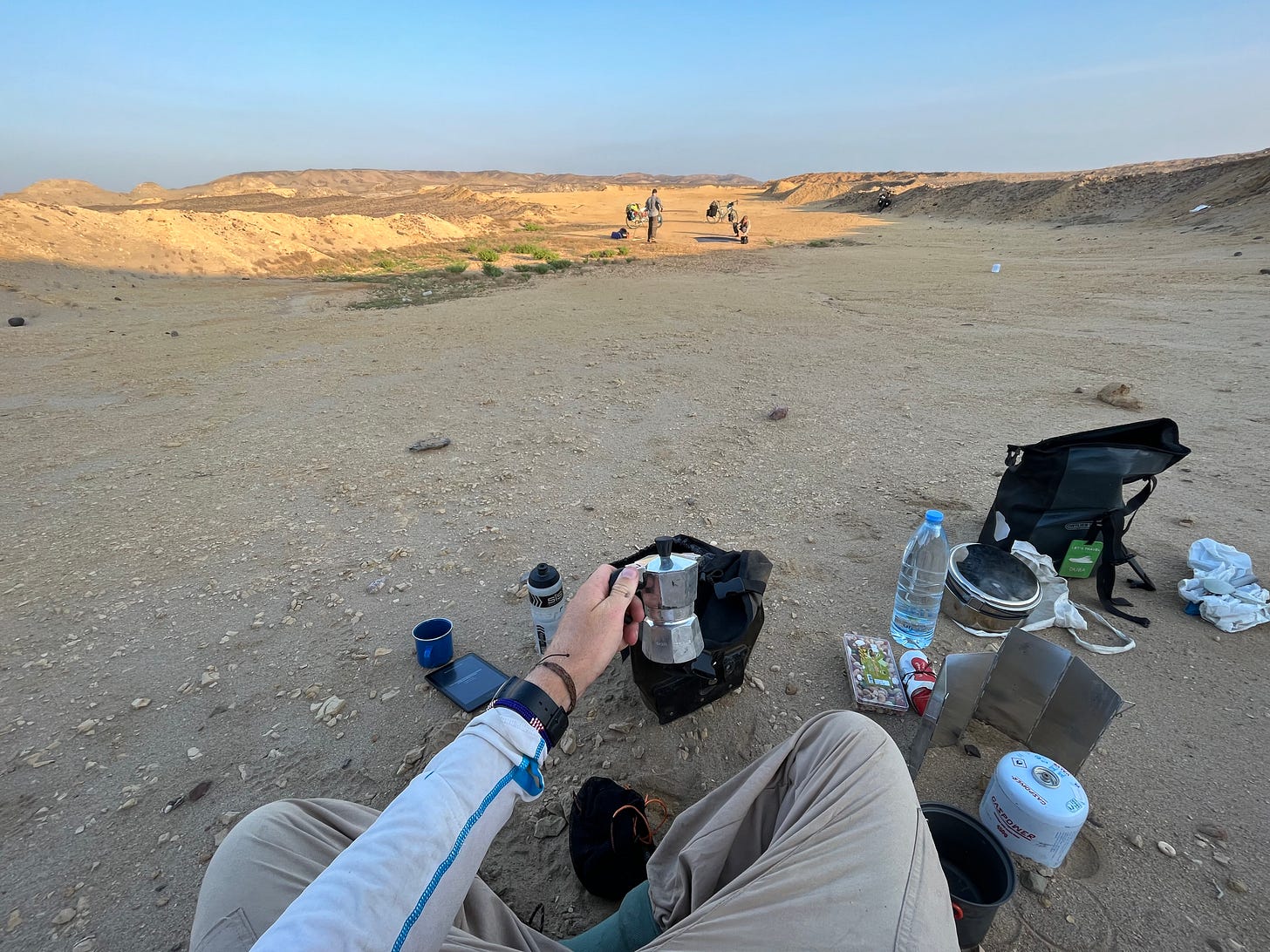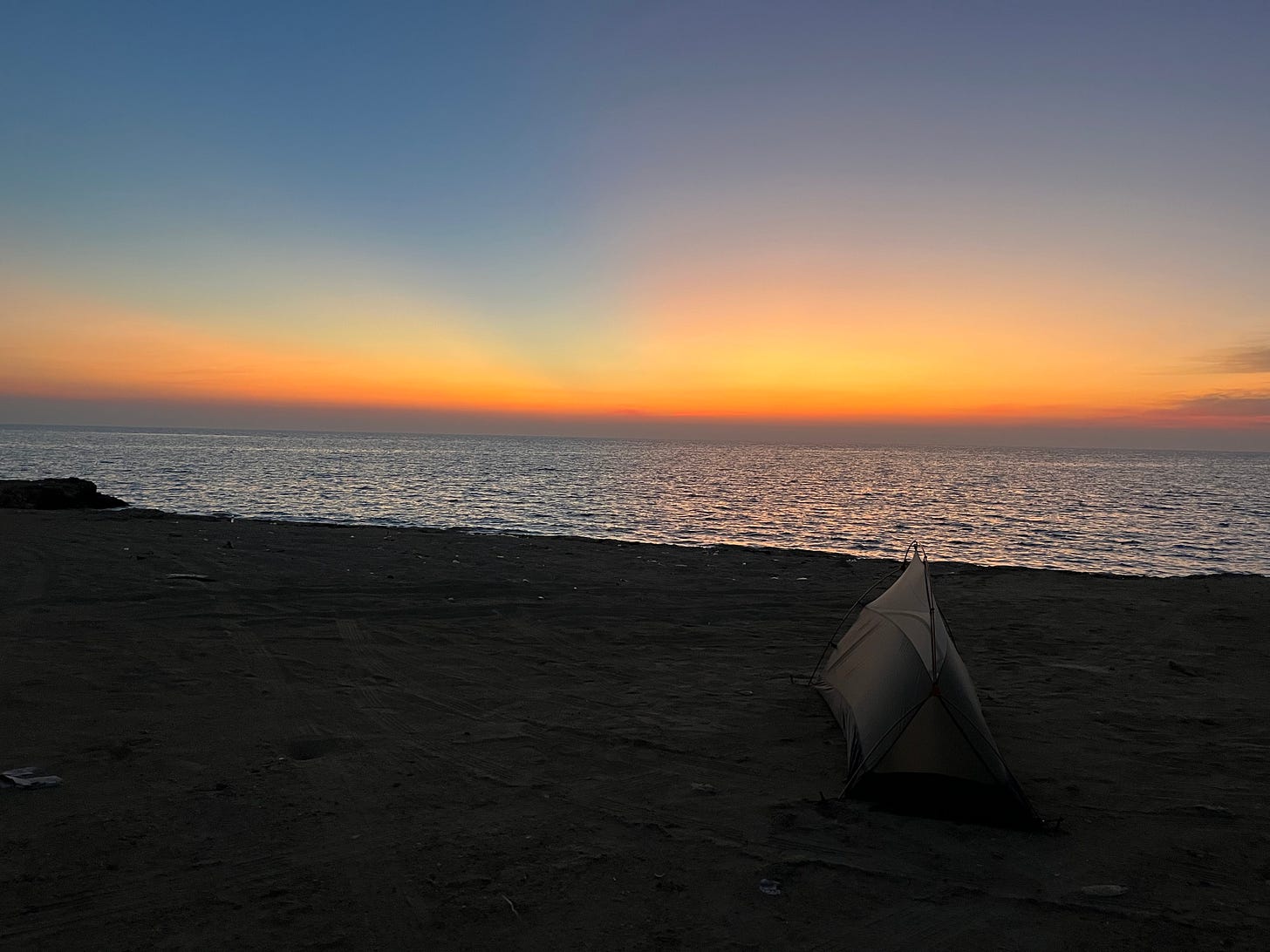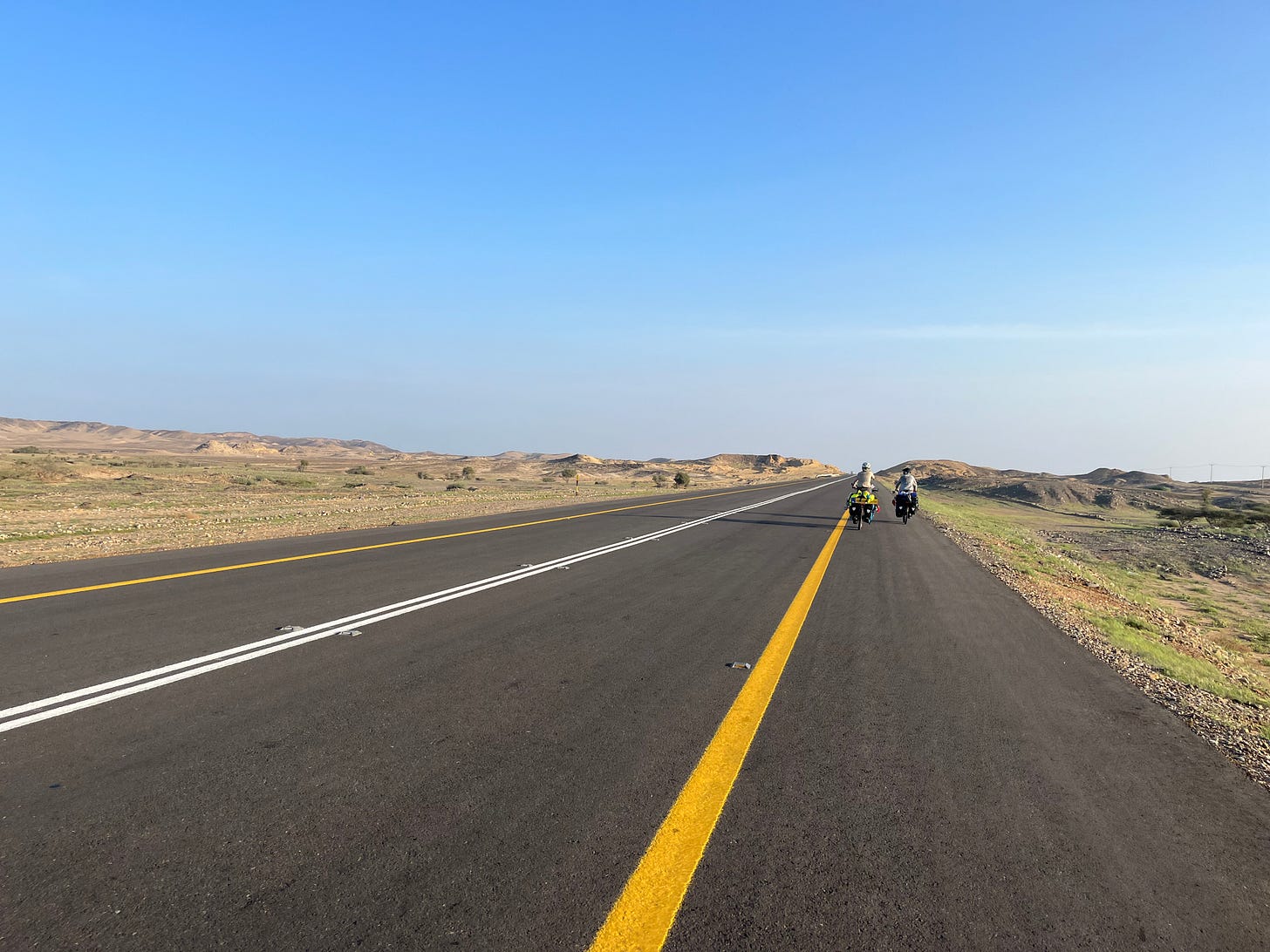163 | You get to experience being dumped — what luck, what a joy.
Jeddah, Saudi Arabia | What’s so great about cycle touring? It forces surrendering.
Today, I sit in Al Balad, the old town of Jeddah. Yet again, the city is being developed extensively as only the Saudis can: 2.5 million square metres have been cleared (https://www.bbc.com/news/world-middle-east-60691503) for a $20 billion project. “It will be like Dubai,” I am told.
In the old town most buildings appear to have been compulsorily purchased. They still stand and undergo refurbishment; the wooden shutters are rebuilt and painted, and the stonework is cleaned, chiselled and pointed. The lines of small shops, each two by three metres, are immaculately rehoused under neat engraved wooden signs. Pointedly, Jeddah — as with the rest of the country — was closed to tourists until 2019. As part of the Kingdom’s Vision 2030 initiative, 49 countries can now buy tourist visas. The pandemic, of course, slowed the opening to tourists and hindered development, but walking around today doesn’t appear to be any let-up in the rush to re-imagine the city. It has great vibrations.
So, what’s so great about cycle touring? This is the question I’ve been changing gears over this week as we’ve arrived in Jeddah and wandered the city.
Cycle touring: it doesn’t look super cool, is hard on the body, and is uncomfortable. It drags on for time, so you’re invariably relatively poor; working while cycling is impossible. It’s two Schwalbe tyres from voluntary homelessness. But, besides seeing lots of our beautiful world, the act of being broadly self-sufficient for months — setting and collapsing camp, meeting and leaving strangers, winding up and rolling down hills — is an act of learning to surrender. Things go wrong, and that’s a good thing.
I first read The Surrender Experiment by Michael Singer five years ago, and its relevance still haunts me. Michael’s core insight is understanding that our preferences — our likes and dislikes — are irrelevant on a cosmic scale. Trillions of chance happenings have occurred to get us here, from the formation of the sun to the hatching of life to the procreation of every one of our ancestors. Millions of generations precede us. Then we get upset because the bus is slow, we get a puncture, or our coffee is cold. It’s absurd. Of all the things which did happen — quite remarkably — for you to be able to sit on a Sunday morning and read this, and for me to sit on a Saturday morning and write it — we cry at the things which didn’t quite work out. So what, your relationship fell apart, so what if you’re made redundant? You’re alive, aren’t you? — says Michael — and isn’t that incredible? You get to experience being dumped — what luck, what a joy.
So that’s Michael’s core and burning insight — and I love it. In the book, he explains how he surrenders.
I could see that the practice of surrender was actually done in two, very distinct steps: first, you let go of the personal reactions of like and dislike that form inside your mind and heart; and second, with the resultant sense of clarity, you simply look to see what is being asked of you by the situation unfolding in front of you. What would you be doing if you weren’t being influenced by the reactions of like or dislike? Following that deeper guidance will take your life in a very different direction from where your preferences would have led you. That is the clearest I can explain my surrender experiment, and it became the foundation of both my spiritual and worldly life.
When things don’t work out, we often fret. We don’t look for what’s being shown, often blatantly, to us.
One minor but fun example happened to us in Umluj last week: On our cycle towards the town, we took a break at a mosque and met a wealthy Saudi with Mont Blanc sunglasses. Excellent sunglasses, I thought — he must have a lovely house. As luck would have it, reading our minds, he invited us to stay. Saudis are ridiculously hospitable, so we said yes- please- thank you.
Later, closer to town, we were stopped by a rough-looking Saudi in a pick-up. He spoke no English, and his car was a mess. He told me he had a camel and that we must meet it. I brushed him aside; I presumed he lived in the wrong direction. I nevertheless saved his number, “Camel Umluj”.
We cycled on, arrived in Umluj, and called Mont Blanc sunglasses. No response. I messaged, but still nothing. Let down, we spent five hours asking people if we could stay. The cheapest hotels were $200 per night, far beyond our budget. Surely someone would take us in? Camel Umluj kept calling, and I ignored him — remember, he looked too rough and rogue. Eventually, at 8 pm, from desperation, we messaged Camel Umluj and asked him if we could stay. “Can we camp?”
Immediately, with a smile he picked us up in his truck, took us for coffee and then for fried chicken (divine), and hosted us. We had breakfast at six the following morning and spent a few hours with his camels. He was the sheikh of the local clan, an absolute boss, and a national camel racing champion. We never did hear from the Mont Blanc sunglasses, and I am glad. For hours, we ignored the signals to surrender; as soon as we did, things worked out.
I had Mont Blanc shaped preferences; they were irrelevant. It’s best to drop our preferences altogether. Alan Watts tells an illustrative Taoist story of a farmer whose horse ran away:
That evening the neighbours gathered to commiserate with him since this was such bad luck. He said, “Maybe.”
The next day the horse returned, but brought with it six wild horses, and the neighbours came exclaiming at his good fortune. He said, “Maybe.”
And then, the following day, his son tried to saddle and ride one of the wild horses, was thrown, and broke his leg. Again the neighbors came to offer their sympathy for the misfortune. He said, “Maybe.”
The day after that, conscription officers came to the village to seize young men for the army, but because of the broken leg the farmer’s son was rejected.
When the neighbours came in to say how fortunately everything had turned out, he said, “Maybe.”
Live well,
Hector




